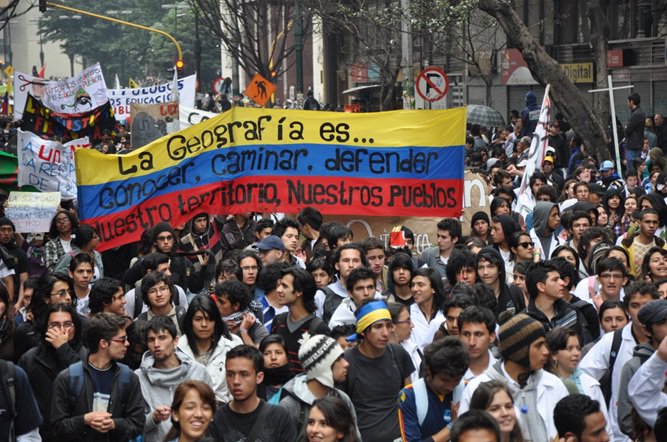Indigenous Colombians march to Bogota, demand meeting with president
Some 5,000 indigenous people from southeast Colombia on Thursday set out on foot and in buses to the capital Bogota to protest the government's economic and social policies and demand a meeting with President Ivan Duque. The march, which departed from the city of Cali, is known in Colombia as a "minga." Organizers plan for it to reach Bogota on Monday, in time to join a Wednesday national strike convened by unions, student organizations and other groups.

- Country:
- Colombia
Some 5,000 indigenous people from southeast Colombia on Thursday set out on foot and in buses to the capital Bogota to protest the government's economic and social policies and demand a meeting with President Ivan Duque.
The march, which departed from the city of Cali, is known in Colombia as a "minga." Organizers plan for it to reach Bogota on Monday, in time to join a Wednesday national strike convened by unions, student organizations and other groups. Though Duque dispatched a delegation of ministers and other high-level officials to Cali earlier this week, indigenous leaders declined to meet them, insisting they would only hold "government to government" talks with the president.
"We want to tell the world that in Colombia we have a president but that he is a president who doesn't serve his people," Ferley Quintero, senior councilor for the Yanacona people, told Reuters. "The southeast minga will continue fighting." The protest is in defense of life, territory, democracy and peace, as well as a rejection of activist murders and recent mass killings, Quintero said. Marchers will call for policies to guarantee the well-being of Colombians and indigenous peoples.
The protesters have not been infiltrated by members of left-wing rebel groups, he added. Government officials have said rebels took advantage of recent protests to stoke violence. "It has always been government policy to stigmatize social protest. It has always been government strategy to stigmatize the political actions of indigenous people," Quintero said, adding protesters will follow protocols to protect against coronavirus.
The government remains open to talks with protesters, Interior Minister Alicia Arango said in Cali earlier this week. Protesters should not block roads or take other actions that would slow economic recovery following more than five months of national coronavirus lockdown, she added.
(This story has not been edited by Devdiscourse staff and is auto-generated from a syndicated feed.)
- READ MORE ON:
- Colombians
- Ivan Duque










